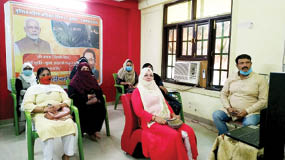New Delhi: After the Narendra Modi government introduced the law to criminalise triple talaq (verbal divorce), Muslim women who were divorced before the law was implemented, called the bill a step forward which has given Muslim women a sense of security in their marriage.
Nida Khan, who is currently 28, was married at the age of 19 in 2015. Later, she was verbally divorced by her husband. There was no law, Nida Khan recalled, to safeguard women from verbal divorce at the time. “So the police was indifferent and refused to take cognizance of my problem,” she said. Clarifying the process of triple talaq, Khan said, “The men assumed a degree of authority over women and by that they would, at any time, divorce their wives by simply pronouncing divorce three times to them. Then, there is this concept of e-talaq where if a person’s wife has gone back to her home, a message would be dropped to her that they have been divorced.” She said, “And this (divorce) could simply come from any situation, like something happens between a husband and wife and she may get divorced in the middle of a way. The biggest sufferers from these divorces would eventually be women. As there is a general perception in society that once a woman has been married, her family no more has any responsibility over her. And when she comes back home it shatters her family. Moreover, the woman feels like a burden in the same family she has spent her life in.”
The Sunday Guardian talked to several women who were the victims of triple talaq. They said that the triple talaq bill has empowered women. Khan, moreover, lauded the bills, believing the issues like she faced before the law have been largely resolved after the law was brought in by the government and women would not have to go through the torment she faced.
While speaking about the awareness of the law among women, Khan said, “First of all, there has been awareness among women so much so that they know that triple talaq is not valid. So if somebody uses it, as people still do even now, then at the same time women goes to the police station and files complaint in the police station that her husband has divorced her verbaly. So police arrests the person immediately and then the next day they take him to court.”
Shayara Bano, another victim of triple talaq, said that women are now coming forward and when they file a complaint, they also get justice. She added, “First when women would go to a police station after getting verbally divorced, the police would say it is the matter of your religion. She would feel weak and helpless and lose hope for the future. Now, the women can directly file a complaint and they are getting justice as well.” In 2021, the law to criminalise triple talaq, claimed Minister for Minority Affairs Mukhtar Abbas Naqvi, reduced such instances by 80% in the country.
The Triple Talaq Bill, officially known as The Muslim Women (Protection of Rights on Marriage) Act, 2019, was passed by the Parliament of India on 30 July 2019 and makes the practice of instant triple talaq (talaq-e-biddat) among Muslims a criminal offence. It also seeks to provide protection to Muslim women from the practice of instant triple talaq. Moreover, it provides for up to three years’ imprisonment and a fine for the husband who divorces his wife through instant talaq.
Furthermore, the legislation also grants Muslim women the right to maintenance and provides for a magistrate to grant bail to the accused husband. The bill also seeks to make the offence cognizable, non-bailable, and compoundable. This means
that the husband can
be arrested without a warrant and the wife can pardon the offence and withdraw
the case.
‘Triple talaq Ban has created a sense of security in marriage for Muslim women’
- Advertisement -

